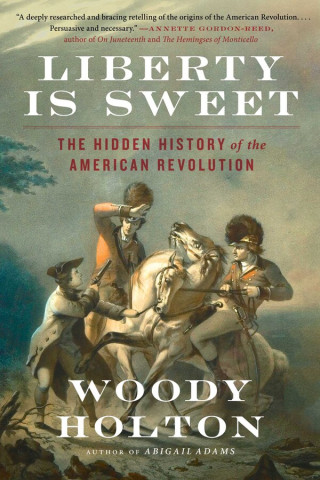Not all by itself. And it didn’t start with Lincoln. It was really African Americans who began the tradition, in which so many of us participate today, of hearing in the Declaration’s preamble an American national and governmental ideal of fostering human equality, they who first publicly noted the grim contradiction between that ideal and the real condition of so many people in America. That’s according to research presented by a number of historians, including Woody Holton, and recently discussed by Holton both in his new book Liberty Is Sweet and on his Twitter. Black people were living and laboring in North America thanks precisely to the perpetuation of racial slavery in the very colonies that were proclaiming human liberty in 1776. Holton quotes Lemuel Haynes, a free black soldier in the War of Independence, later an ordained Protestant minister, who wrote and published an essay—also in 1776!—in which he cited the Congress’s preamble on equality and rights. Haynes argued for extending the concept to its logical conclusion and putting an end to the hideous violations of the ideal inherent in the institution of slavery.
As Holton and others show, Haynes was by no means alone. Abolitionists both black and white took up the idea that the Declaration, as a national founding document, demands a degree of social equality conspicuously absent from the life of the actual nation. Women looked to the Declaration too. In 1848, at the famous Seneca Falls convention, the Declaration of Sentiments renovated the famous preamble to include women, and it listed grievances against women’s oppressive legal status. (If you’re on Twitter, you can search #LemuelHaynesProject there and see Holton’s wealth of primary sources, for pre-Civil War appeals to the Declaration’s founding American principles, on behalf of oppressed Americans.)
And yet it’s not the writings of Lemuel Haynes or the Seneca Falls Declaration that got you and me to believe—regardless of my calling it untrue—that our nation was literally founded not in 1788, with the creation of the Constitution that established the national government, or in 1791, when that Constitution took effect, but in 1776, with the Declaration of Independence. It’s not they who gave us our vision of men gathered in the assembly chamber of the State House in Philadelphia deciding together, with a high, shared purpose, to create a new nation, and to dedicate that nation to a world-shaking proposition, giving the United States an exceptional historical purpose, and putting that purpose on paper by defining legitimacy in government as the promotion and protection of human equality.
We believe that story because Lincoln told it at Gettysburg. If we didn’t believe it, if we had to believe what’s true—that as far as the Congress of 1776 was concerned, it wasn’t bringing forth a nation, had no intention of making equality the basis of anything, and meant something quite different, in its preamble, from all that—we might feel a vertiginous sense of loss, not only of the ideal but also of the failure of the ideal. The ideal and its failure have formed the comfort zone, the safe space, for our mainstream public discussions of the founding. A lot of the current debate devolves on a contest between those who call the founding ideal a lie and those who defend the founders for a least having an ideal, even if they failed to live up to it. What would happen to that dispute if there were no ideal at all?
